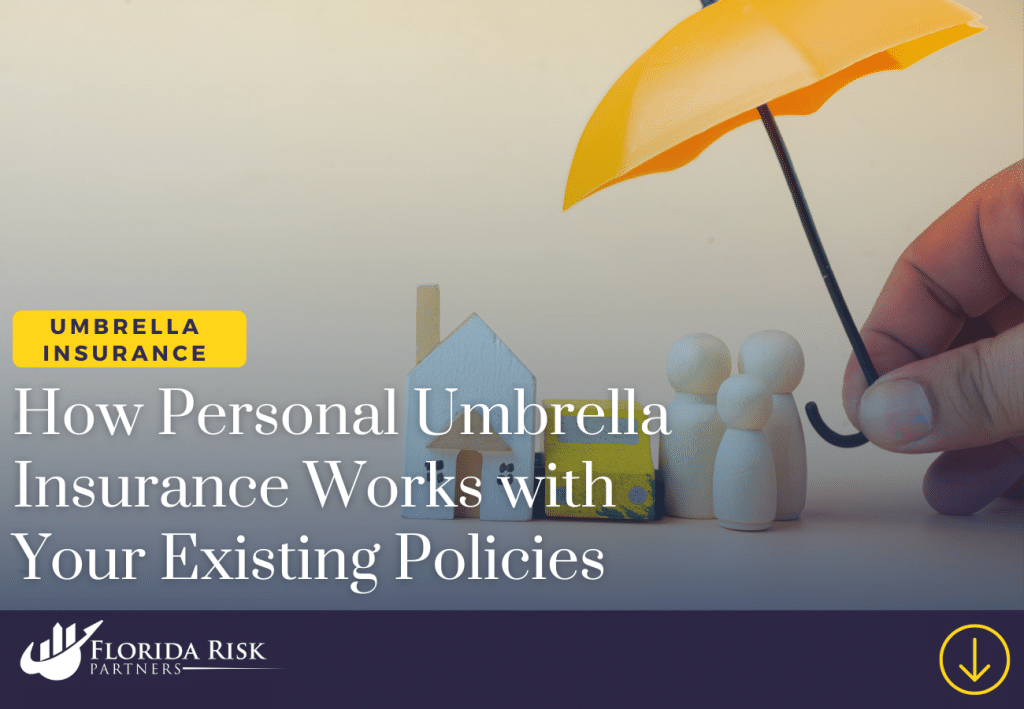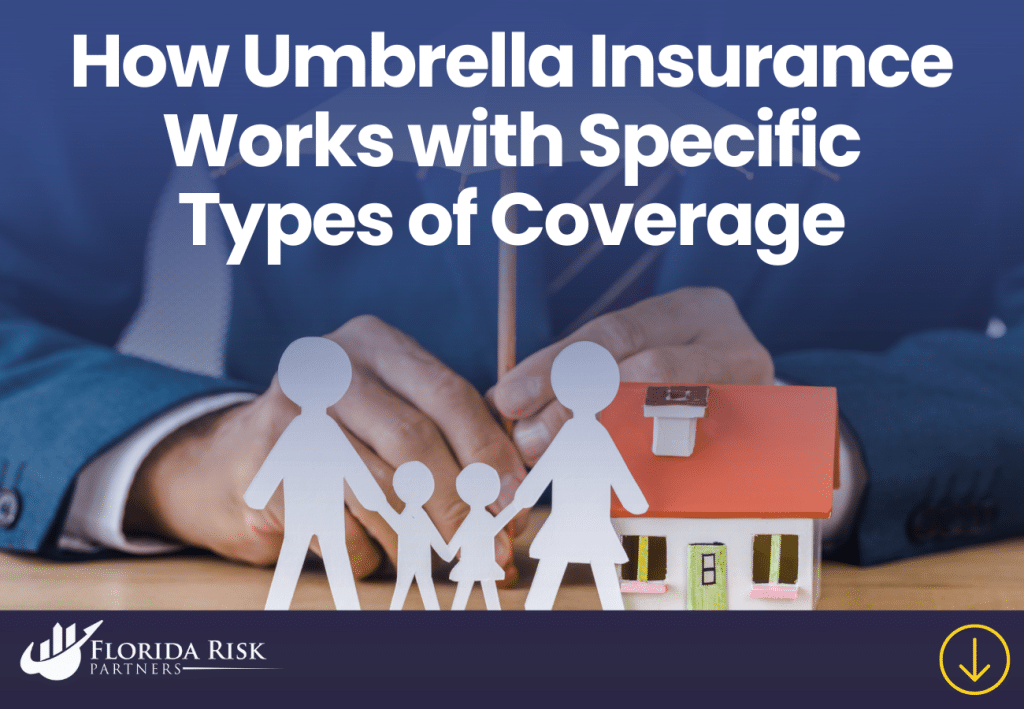-
Main Office: 1434 E. Bloomingdale Ave Valrico, FL 33596-6110
-
Phone: (888) 601-6660
-
Email: info@floridariskpartners.com

For many people, homeowners, auto, and other standard insurance policies provide peace of mind and a certain level of financial security. But these primary insurance policies have limits that may not be sufficient in the event of a major accident or lawsuit. Personal umbrella insurance offers an extra layer of protection that enhances your existing policies, ensuring you’re protected against significant claims that could exceed the liability limits of standard coverage.
In this post, we’ll explore exactly how personal umbrella insurance works with your existing policies, why it’s beneficial, and the mechanics of this coverage. Understanding umbrella insurance with primary policies helps you make informed decisions on liability protection.
Understanding Primary Insurance Policies and Their Limits
What are Primary Insurance Policies?
“Primary insurance policies” refer to common types like homeowners and auto insurance. These policies cover liability for injuries or property damage you’re responsible for. For instance:
- Homeowners Insurance: Covers liability for accidents that occur on your property, such as if a guest slips on your stairs or if your child accidentally damages a neighbor’s property.
- Auto Insurance: Covers liability if you cause an accident while driving, which includes bodily injury and property damage to others.
Standard Liability Limits in Primary Policies
Every insurance policy comes with liability limits, which represent the maximum amount your insurance provider will pay for a covered incident. These limits can vary significantly based on your insurer and the policy you’ve selected. For example:
- Homeowners Policies: Liability limits generally start at $100,000 but can go up to $500,000 or more, depending on the coverage you choose.
- Auto Policies: Many people carry limits of around $100,000 to $300,000 per person for bodily injury liability, with total coverage ranging from $300,000 to $500,000 per incident.
While these limits may seem high, they can quickly be exhausted in severe accidents or lawsuits, especially if multiple people are injured or if significant property damage occurs.
What is Personal Umbrella Insurance and How Does It Work?
Personal umbrella insurance is an additional liability policy that sits on top of your primary insurance policies. It provides extra coverage once the limits of your homeowners, auto, or primary policies are exhausted. Think of it as a second layer of protection, giving you extended liability coverage beyond what’s offered by your standard policies.
How Umbrella Insurance Works in Practice
Here’s how umbrella insurance functions in a real-world scenario:
- Primary Policy Activation: When an incident occurs, your primary insurance (e.g., homeowners or auto) covers the claim up to the policy’s liability limits.
- Exhaustion of Limits: If the claim amount exceeds your primary policy’s liability limits, the umbrella insurance is activated to cover the additional costs.
- Extended Coverage: The umbrella policy then provides coverage up to its own limits, typically starting at $1 million and increasing in increments as needed.
If you’re held liable in a car accident with damages totaling $1 million, your auto insurance has a liability limit of $300,000. Your umbrella policy would cover the remaining $700,000. This ensures you are protected beyond your auto insurance limits. This coordination ensures that you’re not left paying significant out-of-pocket expenses in the event of a large claim.
Get our free comprehensive guide to personal umbrella insurance
Real-Life Scenarios Where Personal Umbrella Insurance Adds Value
Let’s explore specific scenarios where personal umbrella insurance provides crucial support and protection beyond the limits of primary insurance policies.

1. Major Auto Accident
Imagine you’re involved in a multi-car accident that you’re found to be at fault for, resulting in severe injuries to several people and substantial property damage. The medical bills, repair costs, and potential legal fees add up to $1.2 million. If your auto insurance policy has a liability limit of $300,000, you would be personally responsible for the remaining $900,000 without umbrella insurance.
In this situation, this policy would cover the additional amount, preventing a substantial financial hit that could otherwise put your savings, home, and other assets at risk.
2. Property Damage Liability on Your Homeowners Policy
Hosting a large gathering at home can lead to unexpected accidents, such as a guest tripping on uneven flooring. If this results in serious injuries with $600,000 in medical expenses, your homeowners policy only covers up to its liability limit. For instance, if the limit is $200,000, you’d face $400,000 in out-of-pocket costs. However, with umbrella insurance, those additional expenses are covered, preventing financial strain from such incidents.
3. Personal Injury Claims for Defamation or Slander
Let’s say you post a comment online that unintentionally harms someone’s reputation, and they decide to sue you for defamation. These types of personal injury claims aren’t typically covered by homeowners insurance, leaving you vulnerable to significant legal costs and potential settlements. However, personal umbrella insurance often includes coverage for personal injury claims like slander and defamation, ensuring you have coverage for legal defense and settlements.
Key Benefits of Personal Umbrella Insurance as a Layer of Protection
Additional Coverage Above Primary Policy Limits
One of the greatest benefits of umbrella insurance is the additional coverage it provides beyond the liability limits of your primary policies. With coverage starting at $1 million, umbrella insurance ensures that you have substantial financial protection against large claims and lawsuits. This added layer of coverage can be especially valuable if you have significant assets or future earnings to protect.
Protection Against Major Financial Losses
By adding umbrella insurance to your policy portfolio, you’re safeguarding your finances against major financial losses. For many, their home, savings, and investments represent years of hard work and planning. In the absence of umbrella coverage, a severe accident or unexpected lawsuit could put these assets at risk. Umbrella insurance helps protect these assets, ensuring your financial future remains secure.
Coverage for a Broader Range of Liability Claims
Umbrella insurance also offers broader liability protection than most primary policies, covering additional claims such as libel, slander, false arrest, and invasion of privacy. These types of personal injury claims are increasingly relevant in today’s digital world, where interactions on social media or in the community can sometimes lead to misunderstandings and legal action. Having umbrella coverage provides an extra layer of peace of mind.
Affordable Premiums for High-Value Protection
Despite its extensive coverage, personal umbrella insurance is relatively affordable. Most policies cost $150-$500 annually for $1 million in coverage, with affordable increments available. Umbrella insurance is a cost-effective way to secure financial stability with high-value protection.
How Umbrella Insurance Works with Specific Types of Coverage
Let’s explore how umbrella insurance works with homeowners, auto, and renters insurance for comprehensive coverage.
Umbrella Insurance with Homeowners Insurance
When combined with homeowners insurance, an umbrella policy provides extra liability protection for incidents that occur on your property. Homeowners insurance typically covers injuries to guests, property damage, and some personal injury claims. Umbrella insurance covers extra costs, like legal fees and medical bills, beyond homeowners policy limits.
Example Scenario:
- A neighbor’s child is injured while playing on your property, leading to a liability claim of $500,000. If your homeowners insurance covers only $200,000, an umbrella policy would cover the remaining $300,000, protecting you from significant out-of-pocket expenses.

Umbrella Insurance with Auto Insurance
Umbrella insurance adds value to auto insurance by covering significant medical, legal, and damage expenses. Furthermore, auto policies often have limits for bodily injury and property damage. In serious accidents, this policy offers extra protection against high-cost claims.
Example Scenario:
- You’re involved in a multi-vehicle accident, with total claims amounting to $900,000. Your auto insurance has a liability limit of $300,000, meaning you would need to pay the remaining $600,000 out of pocket if you didn’t have umbrella insurance.
Umbrella Insurance with Renters Insurance
Renters insurance, like homeowners insurance, offers liability coverage for incidents within your rental property. However, these policies often have low liability limits. An umbrella policy boosts liability coverage beyond renters insurance for significant assets or earnings.
Example Scenario:
- A guest trips over a loose rug in your rental property, leading to a $250,000 claim. If your renters insurance covers only $100,000, an umbrella policy would cover the additional $150,000.
When Does Umbrella Insurance Not Provide Coverage?
Umbrella insurance offers broad protection but has exclusions, such as:
- Intentional Harm or Damage: Umbrella policies don’t cover intentional acts of harm or damage caused by you or a family member.
- Business-Related Incidents: If you’re sued for something related to a business you own or operate, you’ll need a commercial umbrella policy, as personal umbrella insurance excludes business liability.
- Certain Vehicles: Some vehicles, like aircraft and certain watercraft, may not be covered under personal umbrella insurance unless specifically included in your policy.
- Contractual Liability: If you enter into a contract or agreement and a claim arises from it, your umbrella policy may not cover the incident.
Understanding exclusions helps clarify coverage boundaries and plan for any additional protection needed.
How to Integrate Umbrella Insurance with Your Existing Coverage
Adding this policy requires meeting your insurer’s liability limits on primary policies. Typically, insurers require $300,000 homeowners and $250,000 auto liability coverage. Start by reviewing your existing policies for required liability limits. Contact your insurer to confirm umbrella policy eligibility. Ensure your primary policies meet the minimum coverage requirements. Finally, integrate umbrella insurance to enhance your overall financial protection.
- Review Your Current Policies: Check the liability limits on your homeowners, auto, or renters policies to see if they meet the requirements for umbrella coverage.
- Adjust Limits if Needed: If your current liability limits are below the insurer’s requirements, consider increasing them to qualify for an umbrella policy.
- Choose an Appropriate Coverage Amount: Assess your assets, income, and potential risks to determine the right amount of umbrella coverage, typically starting at $1 million.
- Coordinate with Your Insurance Agent: Collaborate with your agent to align your umbrella policy with primary coverage and needs.
Conclusion: Protecting Your Financial Future with Personal Umbrella Insurance
This insurance offers added protection, enhancing existing policies against unpredictable accidents or lawsuits. This coverage complements home, auto, and renters insurance, safeguarding against high-cost, unexpected claims.
Download our in-depth e-book to learn more about umbrella insurance and explore your options. Enhancing your liability protection today secures your financial future and provides lasting peace of mind.
Call Us Or
Schedule an Appointment
Select an agent below to view our online calendars and select a day and time that works best for you or call us directly at 888-601-6660. When you use our online calendars, you will receive an email with more information.



